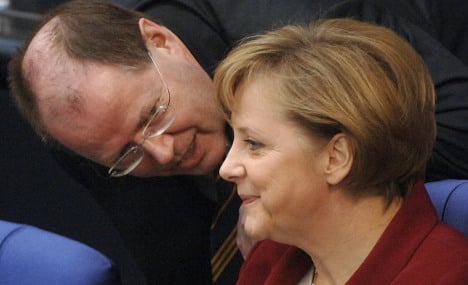If Berlin was not full of vacuous election posters, a foreign visitor to the city would never clock on to the fact that a German parliament will be elected in five weeks. And if, out of curiosity, the visitor was to look at these posters or, in a moment which they would later come to regret, read the election manifestos of the parties, they would wonder what this election was all about.
It is certainly not about the biggest challenge facing Germany since reunification – the future of the euro and the debt crisis. Problems in the eurozone are too complex and abstract to take centre stage in this barren election campaign.
Instead we have been subjected over the last few weeks to fairy tales, stories about Streusel [a type of German cake], and a wacky idea to charge foreigners to use the Autobahn.
The main opposition party, the SPD, spent the weekend nostalgically celebrating their 150th birthday, with leader Peer Steinbrück and his wife Gertrud reading a fairytale to an audience of children and adults.
Chancellor Angela Merkel, meanwhile, took two weeks off the campaign to holiday in Italy and came back to give an interview about how she liked to cook potato soup and her husband complained that there was never enough Streusel in the kitchen.
Sensing that food might be a vote winner, the Green Party also decided to concentrate on German stomachs, proposing to introduce a ‘Veggie Day’ in German canteens where, once a week, no meat would be served.
This policy took on comical proportions with the liberal FDP, Merkel’s coalition partners, sensing this was something they should be campaigning against, thus giving scathing quotes about the Greens to the media – although some took it too far.
They missed a trick though with their slogans. “My belly belongs to me,” would surely have been perfect for an FDP T-shirt or election poster.
My personal favourite though was from Horst Seehofer, leader of the CDU’s Bavarian sister party, the CSU, who believed he could fly in the face of EU law with his election policy and start charging foreigners to use Autobahns.
For us politicos some excitement can be found in what will happen after the election. Which coalitions will form if Merkel’s partners, the FDP fail to enter the Bundestag with five percent of the vote? Will there be another Grand Coalition between the Conservatives and SPD? Could the SPD and Green Party get enough of the vote to form their own coalition?
But in terms of election issues politicians have played it safe and voters appear to have no appetite for excitement or change. Germany’s economy, especially the labour market, is performing well, particularly when compared with the rest of the European Union.
And, when it comes to European issues, there does not even seem to be a real choice. All major parties in Germany’s parliament have given their support to Angela Merkel’s verdict that ‘there is no alternative’ to her government’s rescue operations.
Even the introduction of a new euro-sceptic party, Alternative für Deutschland (AfD) has failed to spark the election campaign into life.
Its position is popular among a significant minority of Germans, but the AfD is unlikely to attract much public and media attention during the last weeks of campaigning as the eurocrisis looms low in peoples’ minds. They have failed to poll above three percent as more topical or straightforward issues such as taxing the rich, financing renewable energy and education are more likely to dominate debates.
There have been scandals – spying in Germany by America’s National Security Agency (NSA), the government’s mismanagement of the Euro Hawk drone programme. But the opposition has been unable to take advantage of them. It is difficult to pin the scandal on one particular politician or even one party.
And in some respects the elections hardly matter as, barring a huge upset, they will not affect European economic or foreign policy.
Since Germany’s first chancellor, Konrad Adenauer took office in 1949, there has been a remarkable continuity in German foreign, and especially European politics. German politics has always been pro-European and in favour of ever-closer union or more Europe.
September’s elections will not affect this attitude.
The Local




 Please whitelist us to continue reading.
Please whitelist us to continue reading.
Member comments